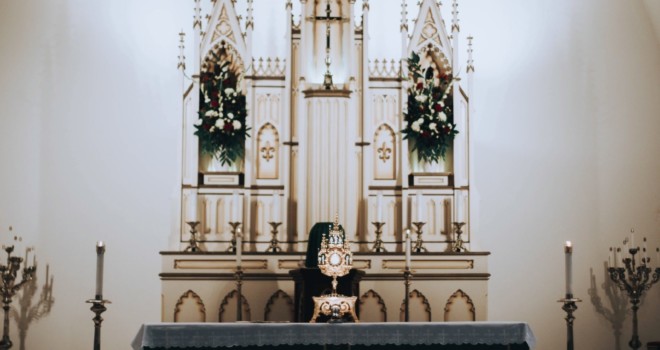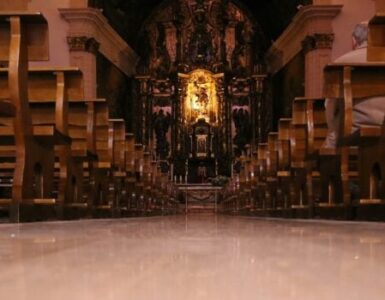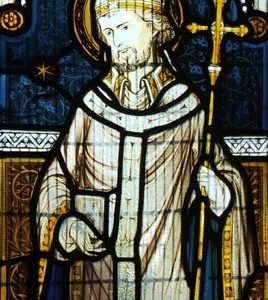Last night I walked into a memory at my former parish, something long-forgotten, and tears began to well.
With all things COVID-19, the pastor had smartly relocated the monstrance from the small Adoration chapel into the main church, where adorers could spread out and kneel in their desire to be close to the exposed Blessed Sacrament.
Without realizing it, I moved into the same pew where I had shuffled into my Holy Hour on a spring Thursday evening 11 years ago. Before the Adoration chapel was built, we adored in the main Church.
It was on that night that I entered into the presence of Christ with what felt like a waterlogged head after invasive brain surgery. Because nerve endings were just beginning to reconnect, it seemed as if an elf had crawled into the center of my head with a carving knife. I couldn’t get around without the aid of a walker and had just begun the work of learning again how to annunciate my words clearly.
For a few years I was the 7-8 p.m. “guardian,” but after my brain hemorrhage, I had all but fallen off the face of the earth. I hadn’t been able to attend Mass or a Holy Hour in months. A pleasant-faced woman I didn’t know personally always accompanied me during the evening hour. We’d acknowledge each other in quiet with quick smiles and whispered hellos.
When the woman saw me enter the side door of the church, she quietly left her pew, gently walked up to me, and delicately reached for my forearm. She said nothing, not even a whispered, Welcome back. There was no overly effusive smile. I don’t recall her smiling at all; I do, however, remember her eyes.
She looked into me for what seemed 10 seconds as if to say: You’ve risen from the dead and this is going to take some time. But you made it back. You’re with Christ here, who heals. And I’m with you, too, just a few pews behind.
I eased into my pew and wept.
Something similar unfolded a few years ago when complications from a knee replacement led to two additional operations in the span of a few weeks. The elf in my brain seemed to have crawled into my right knee, and burning pain had become unrelenting. Eventually, when I was well enough to shuffle (in that same walker) back into Adoration, spring loaded tears came again.
I imagine the sappy, imaginative Irish part of me put me with the gawking apostles in the candlelit Upper Room when he broke the bread.
It’s been a consolation watching priests bend over backwards to serve their parish-quarantined flock during these strange days of plague. Because of their locked church doors, a handful of local priests have provided drive-through confessions and drive-up Adoration. Mini on-line retreats and virtual Stations of the Cross have been offered. Hundreds of priests are now celebrating virtual weekday Masses and some are even stepping out to lead video-recorded Eucharistic processions down city streets. At least one bishop exposed the Blessed Sacrament and led the rosary at the busiest intersection of his diocese.
In these cooped-up, nervous days, it’s a prickly time for keyboard dogmatism. So let’s start with a fact: For better or worse, the Catholic Church, worldwide, has chosen to protect the physical welfare of its laity. It’s chosen the safety of the physical body over the sacramental feeding of souls. The Church has closed its doors to public Masses. I’m not here to argue the merits of pragmatic measures in combatting the pandemic.
Within last week’s frenzy of church closings, though, a single thought kept coming to me: I don’t care much to see a priest now.
Unless a priest is hearing my confession or exposing the Real Presence (which is the reason for sharing the stories above), I don’t need to see him – not online, not anywhere.
It will be his absence that speaks most clearly. In a way, it will indicate to me that he’s accomplishing the work of a holy priest. He is one who understands that the burden of his identity – in the midst of this world-wide travail – is to offer himself as the slaughtered lamb for the salvation of souls.
And how must he do this? He must disappear into the Judean wilderness as Jesus did. Save Satan, no one saw Christ for 40 days. This pandemic is just a few strides out of the starting gate. A marathon lay before us – and it seems many priests are at a full gallop now, even before this awful race has really even begun.
It is time, it seems, just to receive.
For if hospital beds do become overburdened, respirators exhausted, and nurses and doctors overwhelmed within the next few months, it will be the priests who received during these days that will be found walking into the suffering and death as Jesus Christ did into dens of lepers.
“A good priest is going to go into his cave now, go into the deepest part of his inner self to encounter God,” said 93-year old mystic and exorcist Msgr. John Esseff, who received a bilocation from Padre Pio in 1959. “We can do nothing as priests without first receiving His divine love. … but when we truly open ourselves up to God in prayer, we begin to receive the fire of His love and the fullness of His gifts, and then we can begin to truly love and help others.
“We need to be childlike, almost like a newborn baby. All a baby does is depend totally on his mother. When we begin to receive from God in this way, in becoming totally reliant on Him for everything, then we can begin to love with God’s same fiery love.
“And then we can become like St. Francis of Assisi, Ignatius of Loyola and John of the Cross. The cave they entered in order to encounter God became a cave that eventually began to surround their own heart. They could always enter into that cave and serve others because the fire of God’s divine love always dwelled there.”
Who really knows at this point how long we’ll be affected by this virus? Msgr. Esseff and another priest I spoke with said length of time doesn’t matter; what matters now is that priests do their best to receive from God.
“There’s a plethora of good spiritual tools on the web and innovative things – a lot of them virtual – that priests are doing now to help their parishioners. It’s a good thing,” the priest said. “But fundamentally, there is something that distracts us on a computer screen or cell phone.
“The face-to-face encounter with a computer screen keeps us from the true encounter with a living God in prayer. Some could become reliant on what they see on their phone and it could keep them from kneeling face a face-to-face in silent prayer to encounter Jesus Christ hanging on a crucifix.”
Secretariat, the greatest racehorse of all time, won by a stunning 31 lengths to secure the Triple Crown because he set his pace.
Today’s warhorse in the face of this virus, it would seem, would be the priest who’s beginning to disappear into prayer, fasting and mortifications now; one who begs God to have mercy on the world, on his ailing Church and on a society that often seems to have abandoned Him. This priest understands that things invisible — fruits from prayer, fasting, bread into Body, wine into Blood and even COVID-19 — are more real than what’s visible. So like Christ invisible in the aloneness of the desert, the prayerful priest begs God for wisdom and strength to become a Father during this miserable virus season.
If the Catholic summertime virus of 2018 revealed anything, it was this: devoted prayer and supernatural faith had been abandoned by innumerable bishops and priests. Too many showed they were not Eucharistic, penitential or devoted to Our Lady. The spiritual fall out was McCarrick and his species. Understandably, in this current biological pandemic, American bishops asked priests to cancel weekday and Sunday Masses to help prevent the spread of the disease — but McCarrick and his ilk were permitted to spread for decades like an invisible, poisonous gas — perhaps a far-graver pandemic.
It could be argued that the greatest scandal of the Church right now is its reticence to accept responsibility for at least a piece of this plague. Whether due to widely-known clergy abuse, the grotesque display of an Amazonian idol in the heart of the Vatican, cafeteria Catholicism, allowance of “gay clergy retreats,” etc., perhaps God is using this global event to speak to us of idols as he did in Exodus 20:4-5.
I wondered as my family joined in the Pope Francis-inspired worldwide rosary last week if this was the method God wanted employed for us to help in killing off the pandemic.
Before we asked for relief through the powerful intercession of our Lady, I thought we should perhaps imitate the prophets of old and proclaim our guilt in penitential sackcloth and ashes.
“God, I beg for your mercy. I have been a part of your Church that has so greatly sinned, spread evil and caused Mary’s seemingly unending spilling of tears. I have abandoned you in countless ways; I’ve been part of this world that’s made gods of ourselves. Show pity for us for we are great sinners and we do not know what we do.
“For we are reduced, O Lord, beyond any other nation, brought low everywhere in the world this day because of our sins.” (Dan 3:37).
“May your will be done.”
✠
Photo by Annie Theby on Unsplash












